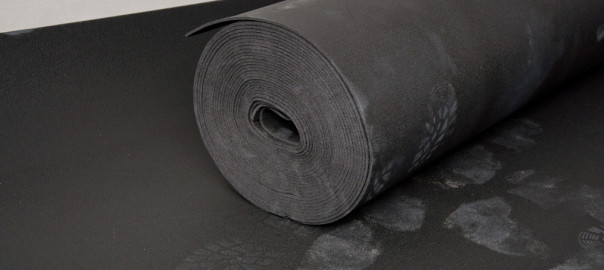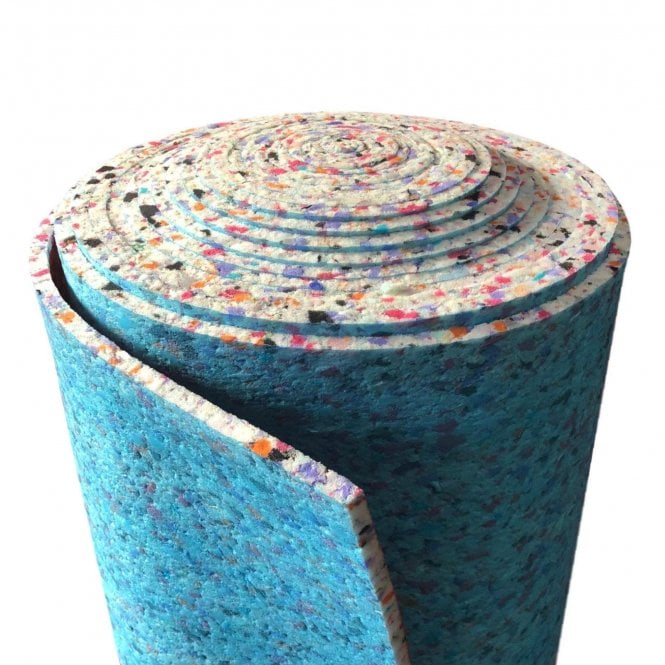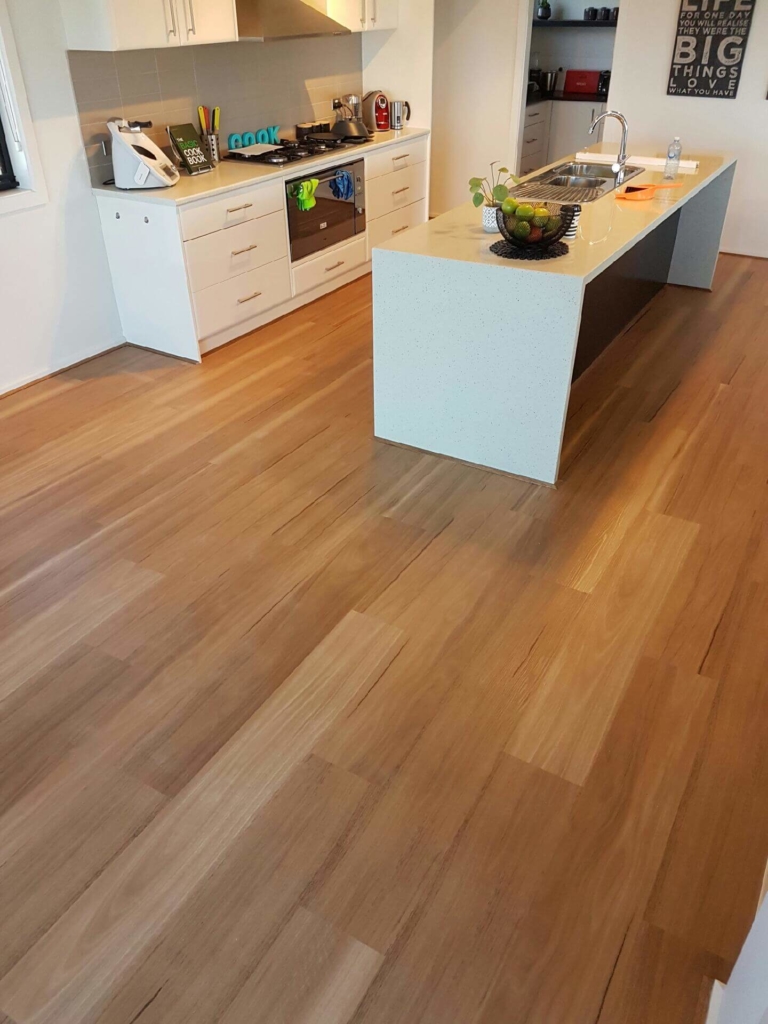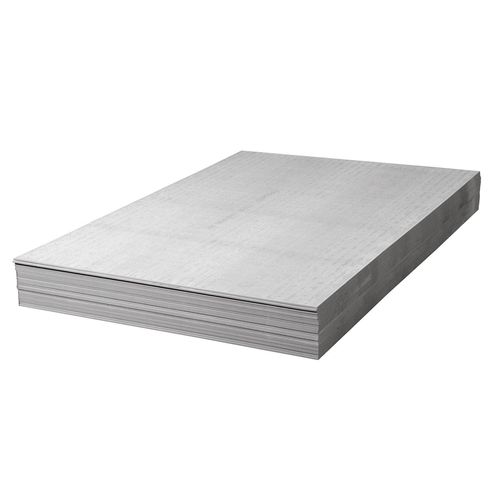
Apartments are the residential staple of any big city, and more Australians are moving towards the apartment lifestyle. But there can be one problem: noise. High density living means you’re much more likely to disturb your neighbours, especially if you have hard floors like laminate, wood, or tiling.
Luckily, soundproof flooring for apartments can be easily installed to reduce the noise levels for your home (it works for houses too). With some good strategic choices you can soundproof your apartment and ensure that you don’t disturb your neighbours.
Types of soundproof flooring for apartments and homes
These are some of the best types of soundproof flooring for apartments and homes.
1. Carpet

Thick foam carpet underlay. Image and product from Flooring Direct
As you might expect, carpets are one of the quietest forms of flooring, especially if you go for a higher pile. This includes both regular “rolls” of carpet and carpet tiles.
Carpets should also be combined with underlays to help absorb a high amount of sound. If you choose a thick foam underlay, you can drastically reduce the sound that goes through your floors.
These underlays are especially popular in older apartment buildings with original timber floors. Floors of that nature often have gaps, which means that sound gets through, and any carpets that are laid can be uneven. With a thick foam underlay, you can address both problems at once.
2. Vinyl
Stylish vinyl flooring in an apartment
Vinyl is a fairly soft material, so is naturally much quieter than harder types of flooring like laminate or hardwood, especially if the vinyl tiles or planks are on the thicker side. It’s also installed with underlay which reduces sound levels further, and again, the thicker your underlay, the better the soundproofing. Luxury Vinyl Plank (LVP) is thought to be one of the best types of flooring for keeping noise levels down.
Some people are put off by the idea of vinyl floors, but modern examples can be surprisingly beautiful. There’s tons of patterns and colours to choose from. It’s an excellent choice for a soundproofed floor.
3. Hybrid flooring

Hybrid flooring. Image from Bellarine Flooring
Hybrid flooring is less rigid than harder materials like wood or tiling and uses a flexible PVC binding that makes it much softer. It also comes with a pre-attached underlay, with varying thicknesses depending on the manufacturer. When purchasing hybrid flooring, there’s a star rating system for acoustics, so aim for the flooring with the highest rating.
If you don’t want carpet or vinyl in your apartment, hybrid flooring is the third best choice for soundproofing.
4. Tiles (with underlay)

James Hardie tile underlay. Image and product from Bunnings
If you love tiles but want your apartment to be soundproof, fear not! You can get solid tile underlays that will do a great job of masking sound. These are different to carpet underlays, made from either ceramic, elastic/foam composites, backer boards, and more. They can be quite heavy which makes them a bit more challenging to lay.
Soundproofing tile underlays usually come with different adhesive properties to carpet underlays, and that just helps the tiles set more firmly, so that there’s no movement between them. Any movement could crack the grout, which would destabilise the tiles and allow more sound through too.
5. Hardwood (with underlay)
Hardwood is naturally noisy, so can be tough to soundproof. We recommend installing an impact barrier underlay to create a gap between the subfloor and the hardwood, which causes the hardwood to “float” and reduces the pressure of footsteps and other noises. The underlay can also include a soundproofing membrane which reduces noise even more.
If you’re installing a brand-new hardwood floor, we also recommend glueing the boards instead of nailing them, as the nails can transfer sound more easily.
What is acoustic underlay?
Acoustic underlay is simply an underlay that has an AAAC star rating of four or above, and so effectively dampens noise. It isn’t a product in itself, as you can buy various types of underlay with high AAAC ratings.
Most Australian apartments require a 5-star AAAC rating by standard, but if you live in an older block, this might not be the case for you. To achieve the best possible soundproofing, you’ll want to choose a quiet flooring type like carpet or vinyl, and choose an underlay with the maximum AAAC rating of 6 stars.
Noise types when soundproofing flooring
When you’re soundproofing flooring for an apartment, there’s two types of noise that are important:
- Impact noise—impact noise is created when an object hits another object. For flooring, this is usually shoes hitting the floor, objects being dropped, chairs being scraped, and appliances like coffee machines being used. The vibrations descend directly into the apartment below.
- Airborne noise—airborne noise is transmitted through the air, and comes from things like televisions, stereos, people talking or shouting, and dogs barking.
Both impact noise and airborne noise can be reduced significantly with certain types of flooring. As we mentioned above, carpet is the best, but vinyl and hybrid flooring can also work well. High quality underlay is absolutely critical for every type of flooring.
How to soundproof pre-existing floors
If you have floors that you’re happy with already, you probably don’t want to go through the hassle of ripping them up to lay soundproof underlays. That’s understandable, but it does limit your soundproofing options a little. Generally, we would recommend laying a soundproof underlay before re-carpeting your floors. But if that’s not an option, you can use rugs to dampen sound over areas where it’s especially reverberant. Not only will that aid with soundproofing, but it will also liven the place up a bit, and help you create a visual focal point in your living space.
Rugs can also reduce floor acoustics even more when combined with rubber mats. You’ll just need to place a thin rubber mat directly underneath the rug, and it will help to mask impact noise from footsteps, the sound of your TV, and much more.
Finally, these are a few other things you can try to make your apartment more soundproof:
- Buy more furniture—a bare room is much noisier than a room filled with furniture, so if your apartment is a little sparse, consider buying some more furniture to dampen the noise.
- Cover your windows—curtains, drapes, and other window coverings are a great way to dampen sound going in and coming out of your apartment.
- Try door sweeps—a door sweep plugs the gap between your door and floor, and can help to reduce a lot of noise between rooms.
Other floor soundproofing tips
There are also things you can do around the house to make things a bit quieter. Take your windows, for example. A lot of noise comes through your windows, and taking steps to prevent that is one of the best ways to soundproof your apartment. Double glazing together with soundproof underlays can keep almost all of the street noise, neighbourhood noise, and the occasional loud music out of your apartment. But that just depends how seriously you take your peace and quiet—double glazing can be expensive, after all!
So do some experimenting, and see if you can use the tools you have to improve your apartment’s acoustics. If not, it might be time to look at some flooring-based solutions.





